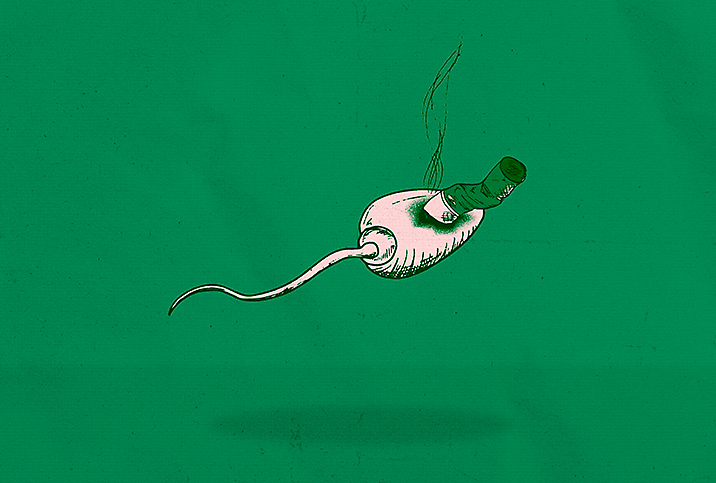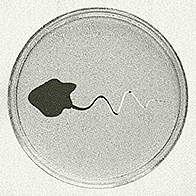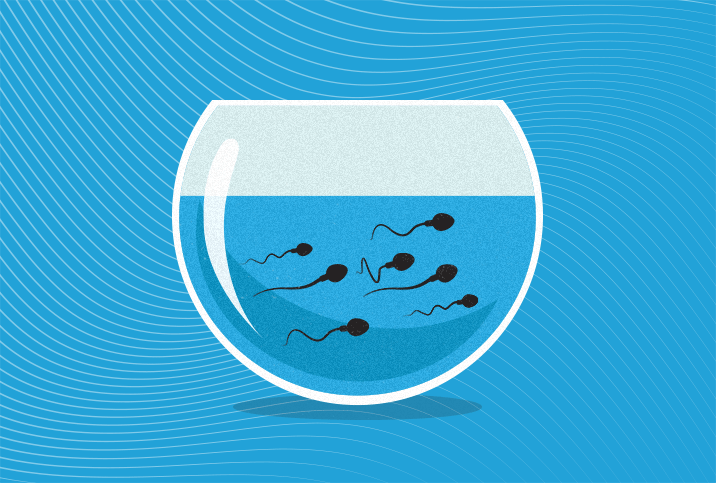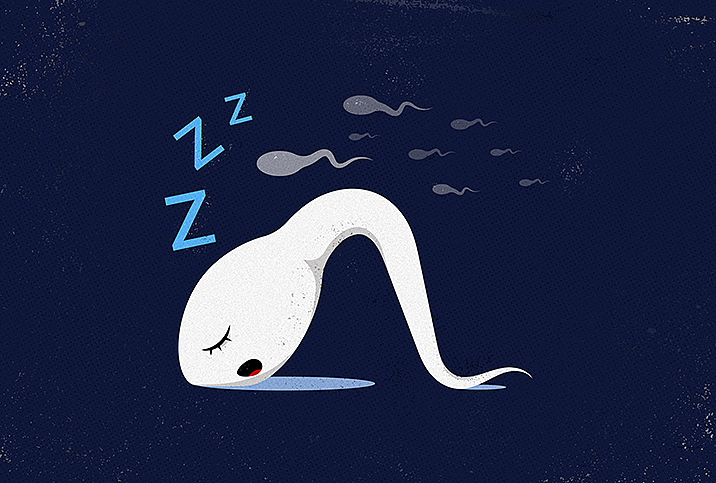What Smoking Can Do to Your Sperm

Here's another reason to not keep smoking: It can affect your ability to conceive.
Smoking damages sperm, which makes men who smoke less likely to get their partner pregnant. Research has shown that DNA in male smokers' sperm is fragmented, meaning the DNA is fragile and more likely to break. This can lead to miscarriages and poor fertilization, which is the inability of a man's sperm to fertilize a woman's egg.
In addition to causing DNA damage, smoking affects both the number and quality of the sperm, according to T. Mike Hsieh, M.D., a urologist and the director of the Men's Health Center at the University of California San Diego Health.
"Usually, when the guy's sperm count is low, the sperm don't move very well, and also the quality of the sperm—that being the sperm's fertility potential—is decreased," Hsieh said.
This combination can contribute mightily to infertility, which the American Society for Reproductive Medicine defines as the inability to achieve pregnancy following 12 months of regular, unprotected sex. Of all infertility cases, an estimated 40 percent to 50 percent are due to "male factor" infertility, according to research.
In addition to causing DNA damage, smoking affects both the number and quality of the sperm.
A cross-sectional analysis of 2,542 men conducted from 1987 to 2004 found cigarette smokers had a lower semen volume, a lower sperm count and a lower percentage of motile sperm compared to men who did not smoke. Heavy smokers, defined as men who smoke more than 20 cigarettes per day, were found to have a 19 percent lower sperm concentration than nonsmokers.
Another large study, from 2003, found cigarette smoking is associated with diminished semen quality. The researchers reported a 15.3 percent decrease in sperm density, a 17.5 percent decrease in total sperm count and a 16.6 percent reduction in the number of motile sperm.
Quitting smoking makes a difference
Most men who quit smoking see significant increases in their sperm parameters within two to three months, according to Helen Bernie, D.O., a urologist and the director of Sexual and Reproductive Medicine at Indiana University Health.
"People say, 'I only smoke on the weekends' or 'I only smoke when I drink alcohol.' Well, you still see the impact on sperm from tobacco up to two weeks after the last date of inhalation," Bernie said. "The less you smoke, the better, but if you're still smoking one cigarette even every two weeks, you're still detrimentally hurting your sperm."
While men produce sperm every day, it takes about 90 days for a baby sperm to become a mature sperm and fertilize the egg, Hsieh said.
"The sooner you quit [smoking], the better," he said.
In addition to cigarettes, men should abstain from other forms of nicotine.
"Some people say, 'I don't smoke, I just use nicotine gum or nicotine packs,'" Bernie said. "Well, it's actually nicotine itself that also causes DNA fragmentation, low sperm count, low motility and low morphology."
The number of swimmers is key
To conceive naturally, Hsieh said, the most important factor is the number of swimmers, because the more swimming sperm, the greater the chance the sperm will swim toward and fertilize the egg.
"It's kind of like, how many lottery tickets do you have to win the lottery? If you have a very low sperm count, it's going to be very hard for somebody to conceive," he said. "Once you have an adequate number of swimmers [and still have issues conceiving], then the quality, the DNA fragmentation, the shape and all that kind of stuff is starting to play a role."
'If you were someone with a low sperm count to start with, and then you add smoking on top of it, that can definitely, really negatively impact your chances.'
Every man is born with an individual, finite potential to make sperm, Hsieh noted. If your starting point is better than average and smoking drops it by half, you're still in pretty good shape, he said.
"If you were someone with a low sperm count to start with, and then you add smoking on top of it, that can definitely, really negatively impact your chances," he said.
This sperm-making potential may explain why some smokers have children, while other nonsmokers struggle to conceive.
"Even though our general advice is to not smoke at all, I think it probably has to do with what people's starting points are and what their fertility potential is," Hsieh said.
Smoking's effects on fertility are reversible
Bernie pointed out that sometimes there isn't much doctors can do to help patients with fertility problems. For example, some genetic conditions can't be changed. However, smoking is a modifiable, preventable and treatable cause of infertility in men, she said, adding that infertility can be treated in any of three ways: behavioral and lifestyle modifications; supplements or medication; or surgery.
Hsieh also called smoking one of the most easily fixed and most reversible types of issues related to infertility in men.
"It will take at least three months of stopped smoking for us to notice the change, because that's the normal life cycle of sperm production," Hsieh said. "If you quit smoking today, you're probably not going to get pregnant tomorrow. It's going to take a little while for that to happen."
Added motivation to quit
Once men learn smoking is contributing to their infertility, they are often motivated to quit, Bernie said.
"When you realize that how you treat yourself impacts the ability of you and your partner to conceive a baby and have a child one day, that's where it gets real," she said.
When her patients ask if they really have to quit smoking, she asks them, "How bad do you want a baby?"
"They both look at their partner, and it's like, 'Wow.' It really hits home," Bernie said. "It's not just about them anymore. This is hurting your future offspring."




















